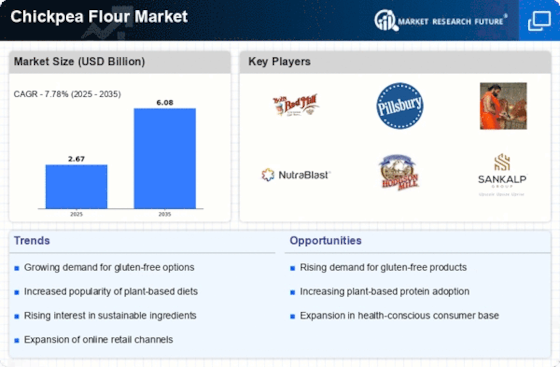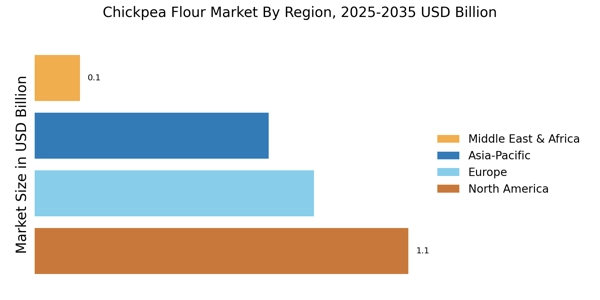Expansion of Plant-Based Diets
The growing trend towards plant-based diets is significantly influencing the chickpea flour Market. As more individuals adopt vegetarian and vegan lifestyles, the demand for plant-based ingredients has surged. Chickpea flour, being a versatile and protein-rich option, is increasingly utilized in various recipes, from baked goods to savory dishes. Market data suggests that the plant-based food sector is expanding rapidly, with projections indicating continued growth in the coming years. This shift towards plant-based eating habits is likely to bolster the demand for chickpea flour, as consumers seek nutritious and sustainable alternatives to animal-based products.
Culinary Versatility of Chickpea Flour
Chickpea flour's culinary versatility is a key driver in the Chickpea Flour Market. It is used in a wide array of cuisines, from Indian to Mediterranean, and is a staple in many traditional dishes. This adaptability allows it to cater to diverse consumer preferences, enhancing its market appeal. The increasing popularity of international cuisines has led to a rise in the use of chickpea flour in various recipes, including pancakes, breads, and sauces. As culinary trends evolve, the Chickpea Flour Market is likely to see sustained interest, as chefs and home cooks alike explore innovative ways to incorporate chickpea flour into their meals.
Nutritional Benefits of Chickpea Flour
Chickpea flour is recognized for its rich nutritional profile, which includes high protein content, dietary fiber, and essential vitamins and minerals. This has led to an increased interest in chickpea flour as a healthy alternative to conventional flours. The Chickpea Flour Market is witnessing a shift as health-conscious consumers incorporate chickpea flour into their diets, driven by its potential health benefits. Research indicates that chickpea flour may aid in weight management and improve digestive health, further enhancing its appeal. As awareness of these nutritional advantages spreads, the demand for chickpea flour is expected to rise, contributing to the overall growth of the market.
Rising Demand for Gluten-Free Products
The increasing prevalence of gluten intolerance and celiac disease has led to a notable rise in demand for gluten-free products. Chickpea flour, being naturally gluten-free, is gaining traction among consumers seeking alternatives to traditional wheat flour. This trend is particularly evident in the Chickpea Flour Market, where sales of gluten-free products have surged. According to recent data, the gluten-free food market is projected to reach substantial figures, indicating a robust growth trajectory. As more consumers adopt gluten-free diets, the Chickpea Flour Market is likely to benefit from this shift, positioning chickpea flour as a staple ingredient in gluten-free baking and cooking.
Sustainability and Environmental Concerns
Sustainability is becoming a crucial consideration for consumers, influencing their purchasing decisions. Chickpea flour is often viewed as a more sustainable option compared to other flours, as chickpeas require less water and are more resilient to climate change. This perception is driving interest in the Chickpea Flour Market, as environmentally conscious consumers seek products that align with their values. Market trends indicate a growing preference for sustainably sourced ingredients, which could enhance the demand for chickpea flour. As the focus on sustainability continues to rise, the Chickpea Flour Market may experience increased growth, appealing to a demographic that prioritizes eco-friendly choices.

















